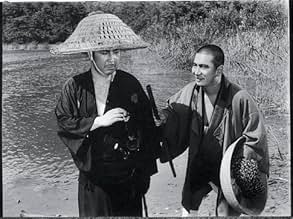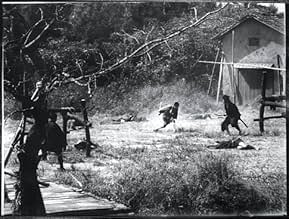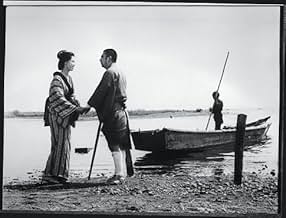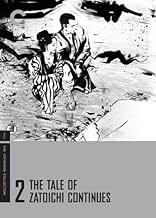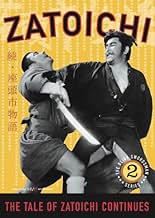IMDb रेटिंग
7.2/10
2.9 हज़ार
आपकी रेटिंग
अपनी भाषा में प्लॉट जोड़ेंThe blind masseur and swordsman, Zatoichi, learns of a powerful political figure's secret and is quickly tailed by a group of killers.The blind masseur and swordsman, Zatoichi, learns of a powerful political figure's secret and is quickly tailed by a group of killers.The blind masseur and swordsman, Zatoichi, learns of a powerful political figure's secret and is quickly tailed by a group of killers.
Yaeko Mizutani
- Setsu
- (as Yoshie Mizutani)
Tomisaburô Wakayama
- Nagisa no Yoshiro
- (as Jô Kenzaburô)
फ़ीचर्ड समीक्षाएं
Roughly a year after his first run-in with the shady Yakuza types of small-town Japan, a notorious blind swordsman blows back into town seeking an encore. Actually, the hopeful pacifist Zatoichi is merely interested in paying his respects at the grave of a fallen comrade, the honorable samurai he out-dueled last time, but the shadier denizens of this corrupt village have long memories and see his visit as an opportunity for revenge.
While that drama plays out, Ichi makes enemies with a misbehaving prince, befriends a trio of prostitutes and crosses paths with another acquaintance: a one-armed former romantic rival who still carries a grudge. The latter is portrayed by Tomisaburo Wakayama, later known for his lead role in the Lone Wolf and Cub films (and star Shintaro Katsu's real-life brother), which makes his eventual duel with Ichi doubly interesting as a sort of unofficial pre-crossover. Not for the last time, either, as 1970 would produce a match between our blind protagonist and Toshirô Mifune's Yojimbo... but that's a topic for another time.
As The Tale Continues is concerned, I found it a mild step down from the first film. There's more action this time, and a much faster pace, but the additional subplots make for a less focused narrative and drain power from the larger developments and reveals of the third act. Another outstanding performance from Katsu, though, and wow, what a final shot!
While that drama plays out, Ichi makes enemies with a misbehaving prince, befriends a trio of prostitutes and crosses paths with another acquaintance: a one-armed former romantic rival who still carries a grudge. The latter is portrayed by Tomisaburo Wakayama, later known for his lead role in the Lone Wolf and Cub films (and star Shintaro Katsu's real-life brother), which makes his eventual duel with Ichi doubly interesting as a sort of unofficial pre-crossover. Not for the last time, either, as 1970 would produce a match between our blind protagonist and Toshirô Mifune's Yojimbo... but that's a topic for another time.
As The Tale Continues is concerned, I found it a mild step down from the first film. There's more action this time, and a much faster pace, but the additional subplots make for a less focused narrative and drain power from the larger developments and reveals of the third act. Another outstanding performance from Katsu, though, and wow, what a final shot!
In the 1960s and 70s, the Japanese made about 500000 Zatoichi films (or so it seems) and I have thoroughly enjoyed them all, even though after a while they all seem to blend together in my mind. Some viewers, like me, will like the familiarity of the character and story, while I am sure others will feel like "if you've seen one you've seen them all". Regardless of your opinion, they are all well-constructed and fun to watch even if the basic premise of the greatest swordsman being totally blind is ridiculous--you just need to suspend disbelief and enjoy.
This is an early installment of the series and it's better than average because it actually has some continuity--making reference to the prior film in the series. Here, in a follow-up, you see Zatoichi pining for a long lost love and having an ultimate showdown with his main rival. Along the way, he falls afoul of a clan who is trying to kill him to keep their secret (their leader "has issues"). And, as usual, the film is filled with amazing sword fights as well as tender moments. This one won't disappoint and is one of the better Zatoichi films.
This is an early installment of the series and it's better than average because it actually has some continuity--making reference to the prior film in the series. Here, in a follow-up, you see Zatoichi pining for a long lost love and having an ultimate showdown with his main rival. Along the way, he falls afoul of a clan who is trying to kill him to keep their secret (their leader "has issues"). And, as usual, the film is filled with amazing sword fights as well as tender moments. This one won't disappoint and is one of the better Zatoichi films.
The following review is an extract from the book "Shintaro Katsu´s Zatoichi: Complete guide to all movies", which is now available on Amazon.
Zatoichi (Shintaro Katsu), the famous and prodigious masseur and blind swordsman, has arrived in a new region after the adventures narrated in the first film. After confronting some arrogant soldiers, who throw him into the water when they discover him in the boat in which they were crossing a river, he is hired to massage the head of a samurai detachment. However, while he is doing this work, he indiscreetly discovers a secret of the lord ("I had never had a client like this one..."), so the samurai will persecute him with the intention of killing him.
(...)
Second part of a long line of films with the mythical blind masseur, hardened player and wandering swordsman Zatoichi as the protagonist. The actor who gives life to the character is, once again, the great Shintaro Katsu. The director of this second part is not Kenji Misumi, but another director (Kazuo Mori). The sequel to "Zatoichi monogatari" (shot the same year, 1962) is not at the same level as the original. There are some gaps in the story; for example, it is never quite clear why the samurai want to kill Zatoichi (What is the secret that the masseur has discovered about the lord? It must be such a big secret that not even the spectator has the right to know...
In any case, Zoku Zatôichi monogatari's viewing is a good opportunity to see Shintaro Katsu and Tomisaburo Wakayama (Zatoichi and Yoshiro, repectively), two greats of the sixties and seventies chambara, who were also brothers in real life.
Zatoichi (Shintaro Katsu), the famous and prodigious masseur and blind swordsman, has arrived in a new region after the adventures narrated in the first film. After confronting some arrogant soldiers, who throw him into the water when they discover him in the boat in which they were crossing a river, he is hired to massage the head of a samurai detachment. However, while he is doing this work, he indiscreetly discovers a secret of the lord ("I had never had a client like this one..."), so the samurai will persecute him with the intention of killing him.
(...)
Second part of a long line of films with the mythical blind masseur, hardened player and wandering swordsman Zatoichi as the protagonist. The actor who gives life to the character is, once again, the great Shintaro Katsu. The director of this second part is not Kenji Misumi, but another director (Kazuo Mori). The sequel to "Zatoichi monogatari" (shot the same year, 1962) is not at the same level as the original. There are some gaps in the story; for example, it is never quite clear why the samurai want to kill Zatoichi (What is the secret that the masseur has discovered about the lord? It must be such a big secret that not even the spectator has the right to know...
In any case, Zoku Zatôichi monogatari's viewing is a good opportunity to see Shintaro Katsu and Tomisaburo Wakayama (Zatoichi and Yoshiro, repectively), two greats of the sixties and seventies chambara, who were also brothers in real life.
Never mind the first film to take its time in introducing the character to us, of which I am glad that it didn't rush. Now that we and the others in the film "know" him ( although part of the fun is that nobody is really able to know him and his skill really) the film goes to hyperdrive mode straightaway.
It's fascinating to see this in retrospect, knowing it is a long franchise, and trying to map out the development and where the film and its success came from. Inthink the first film is strong because it takes its time in creating its own universe, simply so that the sequels don't have to work so hard in setting things up. It's nice, and so is the self-reference it allows both in humour and mythology, but the films quickly morph into each other. It doesn't seem to be a problem here, since aren't all series all about working for or against the set rules and archetypes in the previous films?
Anyway, I think the two films have very well set up Zatoichi's blindness as a metaphor, yet it's the first film that's more ambitiously conceived. In this respect these two first films are like "Yojimbo" and "Sanjuro", Kurosawa's duology. The last shot of this film, however, is one of the coolest film moments I know of. Seriously. That last five seconds.
It's fascinating to see this in retrospect, knowing it is a long franchise, and trying to map out the development and where the film and its success came from. Inthink the first film is strong because it takes its time in creating its own universe, simply so that the sequels don't have to work so hard in setting things up. It's nice, and so is the self-reference it allows both in humour and mythology, but the films quickly morph into each other. It doesn't seem to be a problem here, since aren't all series all about working for or against the set rules and archetypes in the previous films?
Anyway, I think the two films have very well set up Zatoichi's blindness as a metaphor, yet it's the first film that's more ambitiously conceived. In this respect these two first films are like "Yojimbo" and "Sanjuro", Kurosawa's duology. The last shot of this film, however, is one of the coolest film moments I know of. Seriously. That last five seconds.
With continuity directly linking it with its immediate predecessor ( released only five months and three weeks prior ) , and also holding a perfect 100 percent score on rotten tomatoes, this beautifully photographed ( in high contrast black and white, like its predecessor ) Zatoichi film is as good as that film was, even if the end scene is too abrupt, although it also shows just how quickly and efficiently Zatoichi fights. A double-edged sword, pun completely intended.
Hypnotically beautiful looking, I could easily tune out the plot, and just enjoy the visuals, and impressive swordplay. Sadly though, this second film is also the final film in this series to be shot in black and white, as the numerous continuation films were in colour.
Hypnotically beautiful looking, I could easily tune out the plot, and just enjoy the visuals, and impressive swordplay. Sadly though, this second film is also the final film in this series to be shot in black and white, as the numerous continuation films were in colour.
क्या आपको पता है
- ट्रिवियाThe Tale of Zatoichi proved to be so popular that this sequel went into production the same year, 1962.
- कनेक्शनFeatured in Best in Action: 1962 (2018)
टॉप पसंद
रेटिंग देने के लिए साइन-इन करें और वैयक्तिकृत सुझावों के लिए वॉचलिस्ट करें
- How long is The Tale of Zatoichi Continues?Alexa द्वारा संचालित
विवरण
- रिलीज़ की तारीख़
- कंट्री ऑफ़ ओरिजिन
- भाषा
- इस रूप में भी जाना जाता है
- The Tale of Zatoichi Continues
- उत्पादन कंपनी
- IMDbPro पर और कंपनी क्रेडिट देखें
- चलने की अवधि1 घंटा 12 मिनट
- रंग
- ध्वनि मिश्रण
- पक्ष अनुपात
- 2.35 : 1
इस पेज में योगदान दें
किसी बदलाव का सुझाव दें या अनुपलब्ध कॉन्टेंट जोड़ें

टॉप गैप
By what name was Zoku Zatôichi monogatari (1962) officially released in India in English?
जवाब
